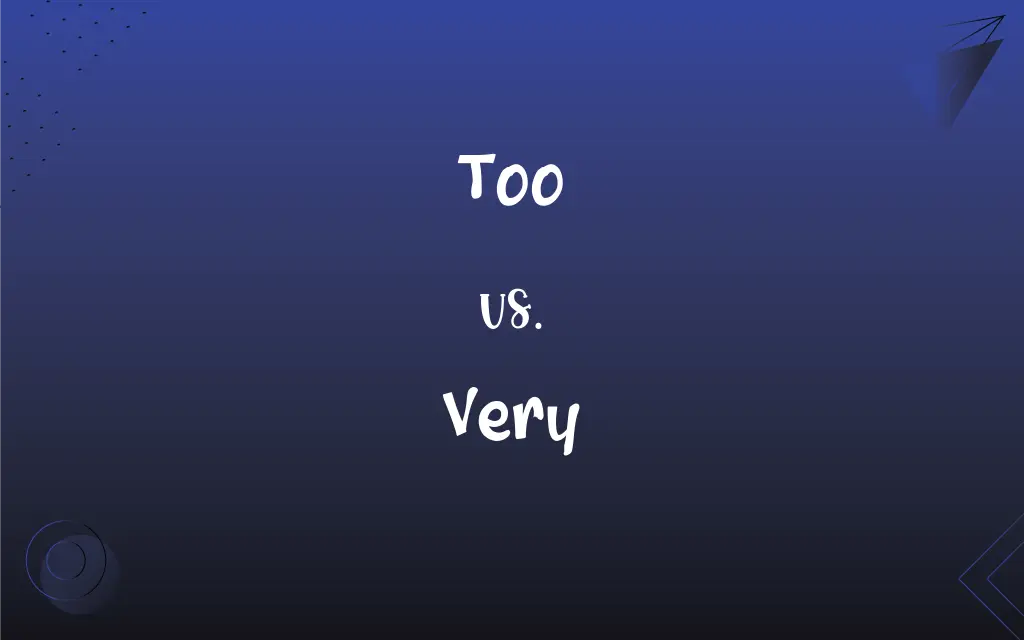Too vs. Very: What's the Difference?
Edited by Aimie Carlson || By Janet White || Published on November 23, 2023
'Too' implies excessiveness or an undesired extent, whereas 'very' is used to emphasize the degree or intensity of something without negative connotations.

Key Differences
'Too' is used to indicate that something is more than what is wanted, needed, or suitable, often conveying a negative aspect. 'Very', on the other hand, intensifies the degree of an adjective or adverb, but without implying excess or negativity.
When 'too' precedes an adjective or adverb, it suggests that the degree of the quality is problematic. In contrast, 'very' is used to strengthen or emphasize a quality, without suggesting that this intensity is an issue.
'Too' often sets up a context where the excessiveness of a trait causes a negative outcome or undesired situation. Whereas 'very' simply boosts the trait's intensity, enhancing the description without implying a negative consequence.
The word 'too' can also mean 'also' or 'in addition', showing another use distinct from 'very'. 'Very', however, remains focused on intensification, not being used in the sense of addition or inclusion.
In usage, 'too' can create a need for change or adjustment due to the excess it implies. 'Very', in its use, does not imply the need for change but simply affirms the high degree of a particular quality or condition.
ADVERTISEMENT
Comparison Chart
Connotation
Negative or excessive
Neutral, intensifying
Usage in Sentences
Indicates excessiveness or undesirability
Strengthens or emphasizes a quality
Implication of Change
Suggests a need for change or adjustment
Does not imply a need for change
Secondary Meanings
Can also mean 'also' or 'in addition'
Lacks additional meanings; purely intensifying
Impact on Sentence Meaning
Can alter the sentence to express a problem
Enhances the sentence without altering its nature
ADVERTISEMENT
Too and Very Definitions
Too
Too can express an excessive degree.
She was too tired to continue hiking.
Very
Very is used to emphasize the degree of something.
The story she told was very interesting.
Too
Too implies a negative outcome due to excess.
This dress is too small for me to wear.
Very
Very serves to strengthen a statement.
It's very cold outside today.
Too
Too means more than necessary or desirable.
The soup is too hot to eat right now.
Very
Very adds emphasis without implying excess.
She is very knowledgeable about art.
Too
Too is used to mean 'also' or 'in addition'.
I want to go to the concert too.
Very
Very intensifies adjectives or adverbs.
He runs very fast in competitions.
Too
Too signifies an undesirable level of a quality.
The music is too loud in this cafe.
Very
Very heightens the intensity of a quality.
The cake is very sweet.
Too
In addition; also
He's coming along too.
Very
In a high degree; extremely
Very happy.
Very much admired.
Too
More than enough; excessively
She worries too much.
Very
Truly; absolutely
The very best advice.
Attended the very same schools.
Too
To a regrettable degree
My error was all too apparent.
Very
Very Used in titles
The Very Reverend Jane Smith.
FAQs
Does 'very' imply a need for change?
No, it simply emphasizes or strengthens a statement.
Can 'too' change the meaning of a sentence?
Yes, it can imply a problem or an excess that alters the sentence's meaning.
Can 'very' be replaced with 'too' in a sentence?
Not always, as 'too' adds a connotation of excess.
What is an alternative to 'too' to avoid negativity?
Phrases like 'extremely' or 'highly' can be less negative alternatives.
How does 'too' function as 'also'?
It can indicate an additional item or agreement, as in "I think so too."
What does 'too' imply in a sentence?
It suggests more than what is necessary, often undesirably.
Can 'too' be used in a positive context?
Rarely, as it mostly conveys excessiveness in a negative way.
Is 'too' used more in informal language?
It's common in both informal and formal contexts.
How is 'very' used differently from 'too'?
'Very' intensifies without suggesting excess or negativity.
Is 'very' used more with adjectives or adverbs?
It's commonly used with both to intensify them.
Are there synonyms for 'very' that avoid repetition?
Words like 'extremely', 'highly', or 'particularly' can be used.
Can the use of 'too' be subjective?
Yes, what is 'too much' for one may not be for another.
Is 'very' neutral in its intensification?
Yes, it neutrally intensifies without negative implications.
Does 'very' have secondary meanings like 'too'?
No, 'very' is solely used for intensification.
Can 'too' be used for emphasis like 'very'?
Yes, but with an implication of something being more than what is ideal.
How does context affect the use of 'too'?
The context can determine if 'too' conveys excess or addition.
Does the placement of 'very' in a sentence matter?
It typically precedes the word it's intensifying for clarity.
Can 'very' be overused in writing?
Yes, overuse can weaken the impact of the writing.
What effect does 'too' have in persuasive writing?
It can be used to emphasize a point of excess or a drawback.
How can 'very' enhance descriptive writing?
It amplifies descriptions, making them more vivid.
About Author
Written by
Janet WhiteJanet White has been an esteemed writer and blogger for Difference Wiki. Holding a Master's degree in Science and Medical Journalism from the prestigious Boston University, she has consistently demonstrated her expertise and passion for her field. When she's not immersed in her work, Janet relishes her time exercising, delving into a good book, and cherishing moments with friends and family.
Edited by
Aimie CarlsonAimie Carlson, holding a master's degree in English literature, is a fervent English language enthusiast. She lends her writing talents to Difference Wiki, a prominent website that specializes in comparisons, offering readers insightful analyses that both captivate and inform.

































































